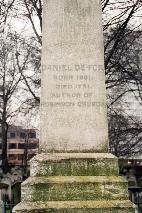Defoe, Daniel |
| NOVELIST (ENGLAND) |
|
BORN c1660, London - DIED 26 Apr 1731, Moorfields (Northern Ireland) CAUSE OF DEATH lethargy GRAVE LOCATION London: Bunhill Fields Burial Ground, City Road, Finsbury |
|
Liberal son of a London butcher, James Dufoe. He was educated well at Morton School (he and his family were dissenters and he would have to take an oath of Loyalty to the Church of England to go to Oxford of Cambridge). By 1683 he had become a merchant and in 1684 he married the heiress Mary Tuffley (two sons, five daughters). He joined the army of Duke of Monmouth to fiht for William of Orange, but when the rebellion failed he was forced into exile on the continent. While he was hiding at a churchyard after the revolution he had seen the name Robinson Crusoe carved on a stone. On the continent he wrote pamflets against James II and was he glad when William of Orange came to power after all. In 1692 Defoe went bankrupt and he would never be free of debt again. He turned to writing and in 1701 he published "The True Born Englishman" which sold very well. In 1703 he was pilloried and imprisoned (from may until november) for his pamflet "The Shortest Way with the Dissenters", which was loved by groups that were enemies of the Dissenters. But the public drank to his health while he stood in the pillory and read his verses aloud. From 1712 until 1713 has was once more imprisoned because of his pamflets. In April 1719 his novel "Robinson Crusoe" was published and it was an instant success. In 1722 if was followed by "Moll Flanders". He also wrote lives of condemned criminals and often went to their cells for their stories. |
| Images |
Sources • Greenwood, Peter, Who's buried where in England, Constable, London, 1982 • Daniel 'The True-Born Englishman' Defoe Biography |




